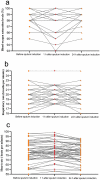Reliability of induced sputum test is greater than that of throat swab test for detecting SARS-CoV-2 in patients with COVID-19: A multi-center cross-sectional study
- PMID: 33073676
- PMCID: PMC7575004
- DOI: 10.1080/21505594.2020.1831342
Reliability of induced sputum test is greater than that of throat swab test for detecting SARS-CoV-2 in patients with COVID-19: A multi-center cross-sectional study
Abstract
We previously reported that sputum induction was more sensitive than throat swabs for the detection of severe acute respiratory syndrome coronavirus 2 (SARS-CoV-2) in two convalescent coronavirus disease 2019 (COVID-19) patients; however, the value and safety of induced sputum testing require further study. We conducted a prospective multi-center cross-sectional study to compare induced sputum to throat swabs for SARS-CoV-2 detection. Confirmed COVID-19 patients from six hospitals in six cities across China who received one or more negative RT-PCR result for SARS-CoV-2 were enrolled, and paired specimens (induced sputum and throat swabs; 56 cases) were assayed. In three paired samples, both the induced sputum and throat swabs were positive for SARS-CoV-2. The positive rate for induced sputum was significantly higher than for throat swabs both overall (28.6% vs 5.4%, respectively; p < 0.01). Patients were divided according to time span from onset of illness to sample collection into the more-than-30-day (n = 26) and less-than-30-day (n = 30) groups. The positive rate for induced sputum was also significantly higher than for throat swabs in the less-than-30-day group (53.3% vs 10.0%, respectively; p < 0.001). For the more-than-30-day group, all paired samples were negative for SARS-CoV-2. Blood oxygen saturation, respiratory rate, and heart rate remained stable during sputum induction and no staff were infected. Because induced sputum is more reliable and has a lower false-negative rate than throat swabs, we believe induced sputum is more useful for the confirmation of COVID-19 and is safer as a criterion for release from quarantine.
Keywords: COVID-19; SARS-CoV-2; induced sputum; reliability; throat swab.
Conflict of interest statement
We declare no competing interests.
Figures
References
-
- WHO . Coronavirus disease (COVID-19) situation reports. 2020. [cited 2020 September23]. Available from: https://www.who.int/emergencies/diseases/novel-coronavirus-2019/situatio...
-
- National Health Commission of the People’s Republic of China . Diagnosis and treatment of pneumonia infected with novel coronavirus. 2020. March 3 [cited 2020 August5]. Available from: http://www.nhc.gov.cn/yzygj/s7653p/202003/46c9294a7dfe4cef80dc7f5912eb19... (in Chinese)
-
- Woloshin S, Patel N, Kesselheim AS.. False negative tests for SARS-COV-2 infection - challenges and implications. N Engl J Med. 2020;383:e38. Epub ahead of print June 5. - PubMed
Publication types
MeSH terms
LinkOut - more resources
Full Text Sources
Other Literature Sources
Medical
Miscellaneous


